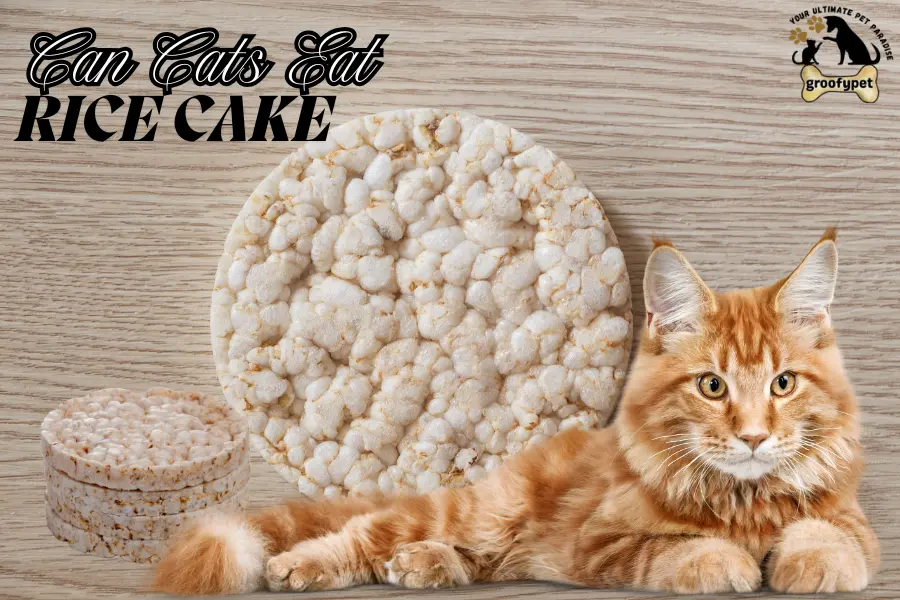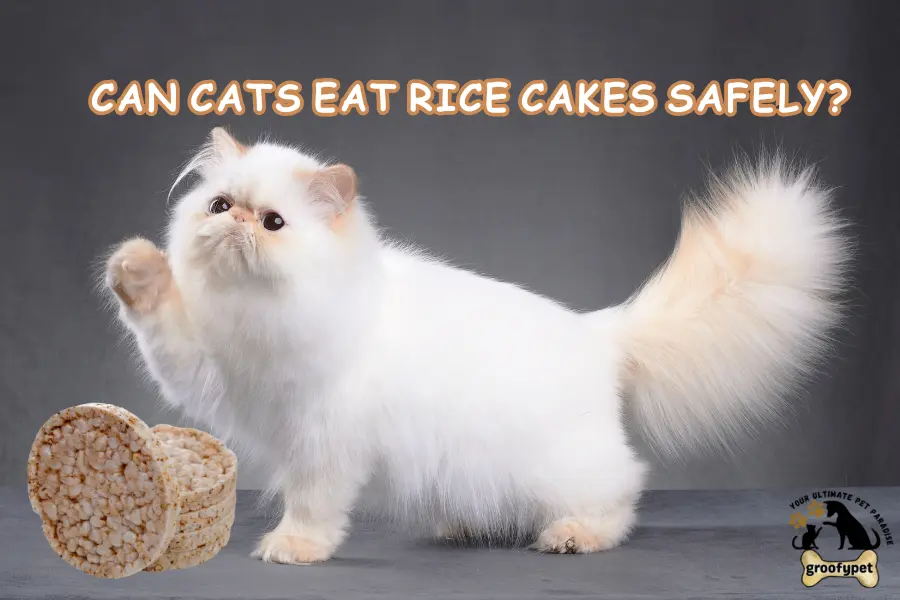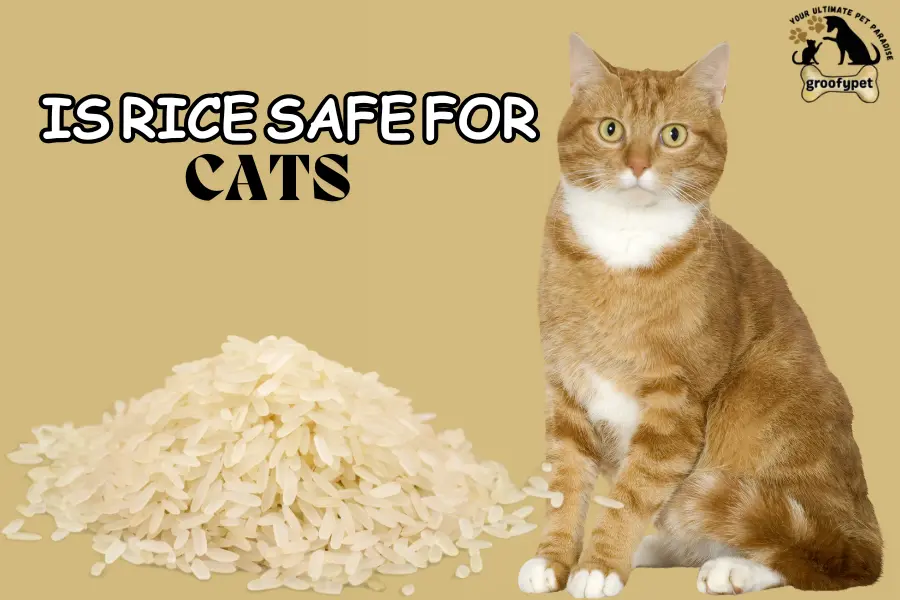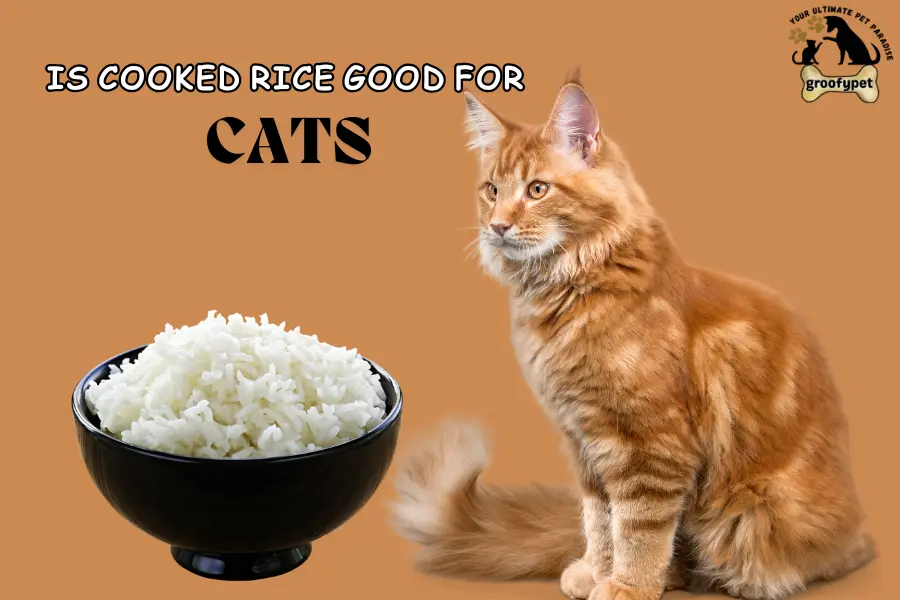
I love munching on rice cakes—they’re light, tasty, and go with almost anything. But every time I tear open the bag, my cat comes running like I’ve opened a can of tuna! I don’t mind sharing a bite, but it always makes me wonder: Can cats eat rice cakes?
These crispy snacks are low in calories and super versatile. Whether topped with avocado and chili flakes, cucumber and hummus, or peanut butter and banana, they’re a fun and easy treat. So, it’s no surprise my cat wants in—after all, she watches me eat them every morning and probably thinks, “If Mom eats these every day, they must be good!”
Table of Contents
ToggleCan cats eat rice cakes safely?
The answer is yes, they can, but they’re not exactly a great snack for your feline friend. If you’re tempted to let your cat nibble on your healthy treats, it’s worth looking closer at what rice cakes are made of—and especially what you’re putting on top.

Rice is a fantastic filling food for us humans. The only rice cakes that are truly 100% safe for cats are those made from pure rice or lightly salted varieties. Rice cakes are a common snack for vegans and health-conscious individuals, but are they safe for cats? While they may seem harmless, rice cakes aren’t ideal for feline diets.
Although they’re not toxic, some varieties contain added ingredients that could be harmful to your cat. More importantly, cats are obligate carnivores and don’t gain nutritional value from rice, making rice cakes more of a filler than a benefit. For these reasons, it’s best to avoid offering rice cakes to your cat.
Can Cats Eat Rice Cakes? The Best Answer
Yes, cats can eat rice cakes, as they are not toxic or harmful to felines. Plain rice cakes typically consist of just one ingredient: rice. However, they offer little to no nutritional value for cats. While plain rice (brown or white) is the main component, flavored varieties may include added salt, sugar, or spices, which aren’t ideal for your pet. So, while rice cakes are safe in small amounts, they shouldn’t be a regular part of a cat’s diet.Is It Safe to Give Your Cat Rice Cakes?
No, it’s best not to feed your cat rice cakes. Cats are obligate carnivores, meaning they rely on meat to meet their nutritional needs and require very little carbohydrate in their diet. Since rice cakes are made solely from rice, they offer no essential nutrients for cats—just empty calories. Feeding rice cakes to your cat adds no real value and may take up space better filled with more appropriate, protein-rich foods.
Potential Hidden Risks of Rice Cakes
Rice cakes seem harmless, but they can carry hidden risks for your cat. The style, flavor, and brand of rice cakes introduce ingredients that aren’t safe for felines. Many varieties contain added sugar, salt, or excess carbohydrates, which are not suitable for a cat’s diet.
Some rice cakes include spices and artificial flavors to enhance taste, but these additives upset your cat’s stomach or cause other health issues. Any other type, especially those with high salt, sugar, spices, or added ingredients, can upset your cat’s stomach and should be avoided. While rice cakes aren’t toxic or dangerous to your cat’s health, they’re not needed in their diet and offer no real benefit.
| Nutrient | Amount per Rice Cake (9g) | Safe/Useful for Cats? | Notes |
|---|---|---|---|
| Calories | ~35 kcal | ✔ In small amounts | Low-calorie, but not a needed source of energy |
| Protein | ~0.7g | ✖ Not sufficient | Cats need animal-based protein |
| Fat | ~0.3g | ✔ Low, but not beneficial | Too little for cats’ fat requirements |
| Carbohydrates | ~7.3g | ✖ Cats don’t need carbs | Cats are obligate carnivores |
| Fiber | ~0.3g | ✔ In tiny amounts | May help digestion, but not necessary |
| Sugars | ~0g | ✔ None | No added sugar is safe for cats |
| Sodium | ~0mg (if unsalted) | ✔ Safe if unsalted | Salted versions are dangerous |
| Vitamins/Minerals | Very minimal | ✖ Not beneficial | Lacks taurine and essential cat nutrients |
Note: Rice cakes offer no essential nutrients for cats and should only be given as an occasional treat in tiny amounts. Always avoid flavored or salted versions.
Always check the Ingredients First
If you are not sure, take a moment to read the ingredients label. Cats and other pets can react badly to foods not meant for them, and some human snacks may hide harmful or toxic ingredients. Even something that seems harmless, like rice cakes, isn’t ideal for your feline.
Stick to treats and dry food that are specifically made for cats, as human foods don’t meet their unique dietary needs and won’t offer any real nutritional benefit. If your cat shows any signs of illness or discomfort after eating a rice cake, contact your veterinarian. It’s always best to be considerate when it comes to your pet’s health. Many commercial pet foods add grains like rice, but it is beneficial for our cats.
1. Rice cakes usually have too much salt for cats
Can cats eat rice cakes? Plain, organic rice cakes might seem harmless for your cat, but let’s be honest—they’re not exactly easy to find, and most rice cakes at the store are flavored to taste better. That’s where the problem starts—salt is often added, and your cat’s body isn’t built to handle much of it. Even just over 40 milligrams of salt per day can be dangerous, putting your cat at risk for sodium ion poisoning.
If your cat eats too much salty food, she might throw up, lose her appetite, act sluggish, stumble, or start drinking and peeing more than usual. If it happens after she sneaks a bite of your rice cake, call your vet immediately. Without quick help, symptoms could get worse—tremors, seizures, or even coma. So when it comes to rice cakes, especially those seasoned with sea salt, it’s best to keep them off your cat’s menu.
2. Rice cakes may contain too much sugar
Sweet rice cakes, like those with caramel or chocolate, might be a tasty treat for you—but they’re not a good idea for your cat. While a little sugar won’t poison them, it can upset their stomach, cause vomiting, or even lead to long-term issues like diabetes, obesity, or heart problems, especially since cats aren’t built to handle too many carbohydrates.
Chocolate is especially dangerous—it contains theobromine, which is toxic to cats even in small amounts. So, if you’re snacking on a chocolate rice cake, don’t let your cat near it. It’s best to skip the sweet stuff and stick to cat-friendly treats instead.
3. Rice cakes might include dangerous spices
While rice cakes come in many varieties, even plain ones can become risky if you add tasty toppings to share with your cat. Flavors like onion, garlic, oregano, or salty seasonings may make them more appealing to you—but they’re a big no for cats.
Onion and garlic, part of the Allium family, can harm your cat’s red blood cells and lead to anemia. Oregano contains compounds your cat can’t digest well, which could cause stomach upset or even liver damage. So, no matter how tempting it is to share, skip the spiced-up rice cakes when it comes to your feline friend.
Rice cakes aren’t a healthy snack for your cat because they lack the essential nutrients. While it’s generally safe if she eats a few pieces that fall on the floor, they shouldn’t be given to her as regular treats.
Can cats eat rice?
Yes, cats can eat rice in small amounts. It’s non-toxic, so they can consume a little in their meals, but they shouldn’t be given too much, as it’s not an essential part of their diet. If you’re feeding your cat a complete and balanced food, they won’t get any additional nutritional benefits from eating rice as a side dish. Plus, too much of this filler could prevent them from getting enough of the healthy diet they need!
Is rice safe for cats?

Cats are obligate carnivores, meaning they are destined to eat primarily meat and are not well-equipped to digest grains. Unlike humans, cats do not require carbohydrates in their diet. Some commercial cat foods will contain grains such as rice, but only in small amounts, carefully considered to provide bulk.
Is cooked rice good for cats?
Since rice offers no nutritional benefits to cats, we suggest avoiding it altogether and limiting them to a quality diet and treats specifically designed for feline consumption. If you do feed your cat rice, offer only a small amount. Make sure it’s thoroughly cooked and free of any seasonings, spices, or sauces.

Never feed your cat raw rice, as it is extremely difficult to digest and may also contain a natural pesticide called lectin, which can cause diarrhea and vomiting if ingested in large quantities. If you notice your cat is bloated and appears to be in pain for more than 24 hours after eating raw rice, be sure to take them to the vet as soon as possible.
-
Plain rice cakes are not toxic to cats but offer little to no nutritional value.
-
Rice cakes with added salt, sugar, or flavorings can be harmful to cats and should be avoided.
-
Cats are obligate carnivores, so their diet should focus on animal-based proteins, not grains.
-
While a small bite of plain rice cake won’t hurt, it should only be given as an occasional treat, not a regular snack.
-
Cats with sensitive stomachs may experience digestive upset after eating rice cakes.
-
Always check the ingredient list before sharing any human food with your cat.
Final Thoughts
Can cats eat rice cakes? Plain or lightly salted rice cakes are generally safe for cats in small amounts, but they don’t provide real benefit and aren’t necessary in a feline diet. Some rice cakes contain added sugar, salt, or seasonings that are harmful to cats. While an occasional bite is unlikely to cause harm, it’s best not to intentionally feed your cat rice cakes. Always consult your vet if you’re unsure about any human food your cat has eaten—after all, rice cakes are made for people, not pets.
Can Cats Live In One Room? Proven Tips For Maximizing Spaces
Why Do Cats like Bells? Magical Connection Between Cats And Bells



